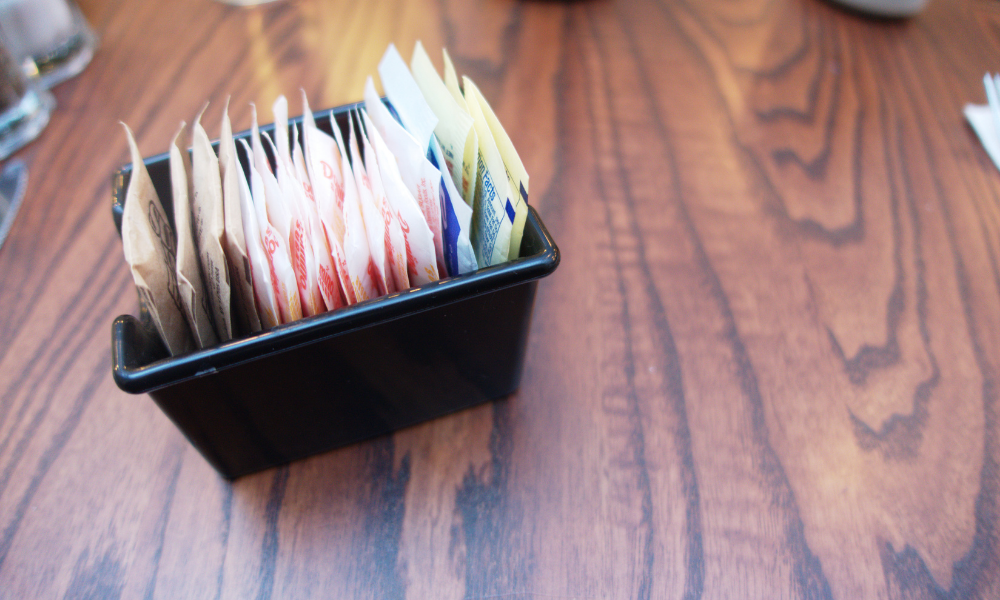As many people become increasingly health conscious, some turn to artificial sweeteners as a way to satisfy their sweet tooth while avoiding the dreaded health concerns associated with sugar. Sucralose, commonly known by its brand name Splenda®, is one such sugar substitute that has gained immense popularity. However, beneath its sweetness lurks potential dangers that are worth discussing. Keep reading to uncover the hidden dangers of using sucralose and why you should think twice before reaching for that yellow Splenda packet.
What is Sucralose?
Sucralose is a synthetic sweetener created in the 1970s and introduced to the market in the late 1990s. It is approximately 600 times sweeter than sugar and is often used in various food and beverage products as a sugar replacement due to its minimal calorie content.
Dangers of Using Sucralose
Metabolic Effects
One of the primary dangers associated with sucralose consumption is its potential impact on metabolism. Growing research suggests that artificial sweeteners, including sucralose, may disrupt the body's ability to regulate calorie intake and appetite. This disruption can lead to overeating, weight gain, and an increased risk of obesity – the very problems many people turn to artificial sweeteners to avoid.
Altered Gut Microbiota
Emerging studies indicate that sucralose may negatively affect gut bacteria, known as the gut microbiota. Aspartame and saccharin have been linked also. Healthy gut microbiota plays a crucial role in digestion, nutrient absorption, immune function, energy production, and overall health. Disturbing this balance may lead to digestive problems, leaky gut, compromised immune function, and chronic inflammation.
Insulin Resistance
Insulin is a hormone responsible for regulating blood sugar levels. Some studies suggest that sucralose consumption could contribute to insulin resistance, a condition where the body's cells become less responsive to insulin's signals. Insulin resistance is a precursor to type 2 diabetes, among many other issues, which can increase the risk of developing chronic diseases like Alzheimer’s, heart disease, and kidney disease.
Potential for Addiction
The intense sweetness of sucralose can create a taste preference for overly sweet foods and beverages. This preference can make it challenging to enjoy naturally sweet foods like fruit. Some research suggests that the intense sweetness of artificial sweeteners may lead to increased cravings for sugary foods, potentially worsening dietary choices over time.
Damage to DNA
The potential for sucralose to damage DNA is a topic that has generated some concern and debate within the scientific community. Some animal studies have raised concerns about sucralose's impact on DNA. These studies have reported an increase in DNA damage and mutations in rodents exposed to high doses of sucralose. It's important to note that these doses were significantly higher than the levels typically consumed by humans.
A new study published in the Journal of Toxicology and Environmental Health showed the digestion of sucralose in humans leads to a toxic by-product called sucralose-6-acetate. This specific by-product is damaging to our DNA. According to one of the study researchers, Dr. Susan Schiffman, “In short, we found that sucralose-6-acetate is genotoxic and that it effectively broke up DNA in cells that were exposed to the chemical."
Cancerous Effects
The question of whether sucralose has cancer-causing properties is a subject of ongoing debate and research. Some studies have shown an increased risk of certain types of cancer in rodents exposed to high doses of sucralose. Human studies on the potential link between sucralose and cancer are limited and inconclusive. Observational studies have not consistently demonstrated a clear association between sucralose consumption and cancer risk. More research is needed to establish any such connection definitively.
Healthy Alternatives to Sucralose
Stevia
Derived from the leaves of the stevia plant, stevia is a natural sweetener with zero calories and a lower risk profile compared to sucralose.
Erythritol
This sugar alcohol occurs naturally in some fruits and is known for its minimal impact on blood sugar levels and metabolism.
Monk Fruit
Also known as luo han guo, monk fruit is a natural sweetener derived from a small green fruit native to Southeast Asia, prized for its intense sweetness without the calories or impact on blood sugar levels.
Allulose
This is a low-calorie sugar substitute that occurs naturally in small quantities in foods like wheat, figs, and raisins, offering a sweet taste without significantly affecting blood sugar levels.
Use in Moderation
The best way to reduce sugar intake is to gradually decrease your reliance on sweeteners. Embrace the natural sweetness of whole foods like fruits and honey, and use sweeteners sparingly.
While sucralose might appear to be a tempting, inexpensive, and easily accessible sugar substitute, it comes with a set of potential dangers that should not be ignored. Its negative effects on metabolism, gut health, insulin resistance, DNA, and possibly cancer are reasons enough to exercise caution.
As with any dietary choice, moderation and informed decision-making are key. Consider opting for safer, natural sweeteners or, better yet, retrain your palate to appreciate the natural sweetness of whole foods. Your health will thank you in the long run.

